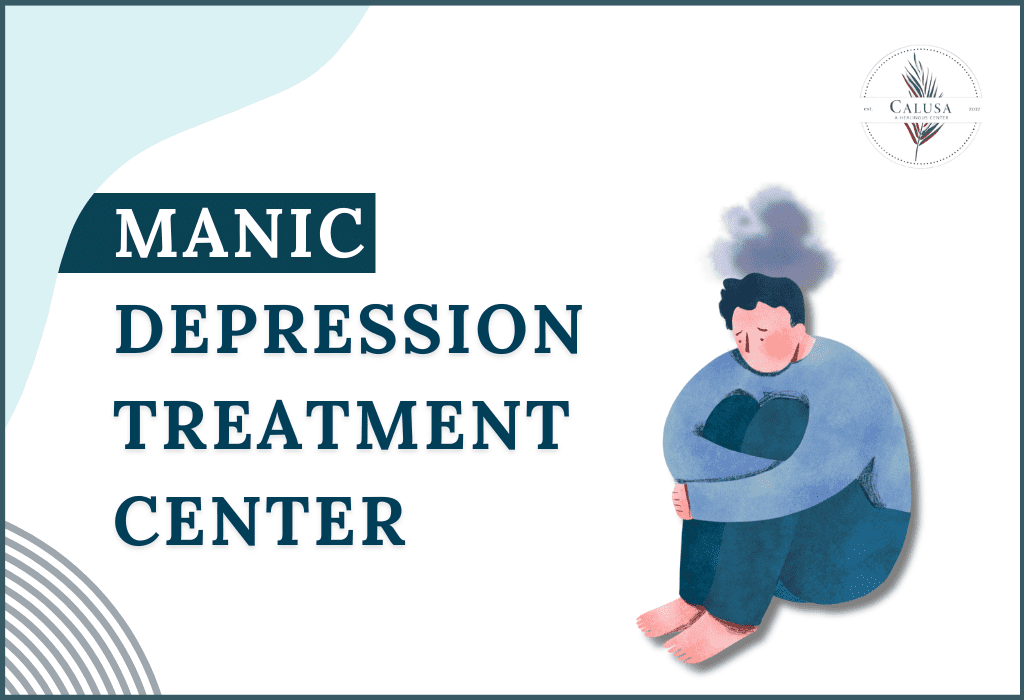Dealing with manic depression, also known as bipolar, can feel like you’re constantly riding an emotional rollercoaster. One minute, you’re full of energy and ideas. The next, everything feels hopeless. This unpredictability can affect your work, your relationships, and your daily life. The good news is that manic depression treatment centers offer specialized support that can help you regain balance, manage your moods, and move towards a healthier, more stable life. But the sooner you seek help, the better.
If you are struggling, don’t wait for things to get worse. Take action now and get the help you deserve.
Take Control of Your Mental Health Today
Reclaim stability with personalized care for manic depression.
What is Manic Depression?
Manic depression, or bipolar disorder, is more than just a feeling happy or sad. It’s a serious mental health condition that causes extreme mood swings, from manic highs to depressive lows. These drastic changes can make it tough to function in daily life, affecting everything from your work to your relationships. The good news is that with the right care and support, you don’t have to face these mood swings alone. According to the study, about 2.8% of adults in the United States experience bipolar disorder at some point in their lives.
A manic depression treatment center is the best place to get the help you need, offering a structured environment where professionals help you understand and manage these mood shifts effectively.
How Manic Depression Affects Daily Life?
When you have manic depression, the emotional ups and downs aren’t just occasional; and they are part of your life. Here is how it may impact your day-to-day living:
- During manic episodes, you may feel euphoric, energetic, or even invincible. This can lead to risky behaviors like overspending, reckless living, or making impulsive decisions that might put you in danger.
- During Depressive Episodes: On the other side, you might feel hopeless, exhausted, or uninterested in things you once enjoyed. The simplest tasks can feel impossible, and you may find yourself withdrawing from others.
- In Relationships: The unpredictable nature of mood swings can strain your relationships with friends, family, and coworkers, often leaving you feeling misunderstood or isolated.
Living with manic depression is challenging, but with the right help, it doesn’t have to control your life. Manic depression treatment centers offer a supportive space to manage these swings and build healthier coping strategies.
Treatment Options at a Manic Depression Treatment Center
A manic depression treatment center provides a combination of treatments that target the specific challenges of managing bipolar disorder. According to the American Psychiatric Association (APA), psychotherapy combined with medication is considered the most effective approach for managing manic depression.
- Medication Management: Medications like mood stabilizers, antidepressants, and antipsychotics are often used to help manage mood swings and reduce the intensity of manic and depressive episodes.
- Therapy: Cognitive Behavioral Therapy is one of the most effective therapies for helping you manage negative thoughts and reactions. Therapy can also help you deal with triggers that lead to mood swings.
- Group Therapy: Group sessions allow you to connect with others who understand what you are going through. These sessions create a supportive community that can help reduce feelings of isolation.
- Psychiatric Support: Doctors and therapists collaborate to create a personalized treatment plan that addresses your unique needs, constantly monitoring progress and adjusting treatments as needed.
- Lifestyle Counselling: A key part of recovery is developing healthier habits. In manic depression treatment centers, you’ll get support in managing daily routines, eating well, and sleeping better, all of which contribute to emotional stability.
These treatments work together to give you the best chance of finding lasting stability and improving your quality of life.
The Role of Manic Depression Treatment Centers in Long-Term Recovery
A manic depression treatment center doesn’t just focus on short-term relief; and it’s designed to support your long-term mental health journey. Here’s how it works:
- Ongoing Therapy: Therapy sessions help you keep your mental health in check. They teach you how to recognize early warning signs of a mood shift and how to respond before things spiral out of control.
- Creating a Support System: Recovery isn’t just about treatment. It is about building a network of support. These centers help you stay connected with others who are going through similar experiences, creating a sense of community.
- Developing Coping Mechanisms: Life will still have challenges, but you will be better equipped to handle stressful situations or difficult emotions without letting them overwhelm you. These centers teach lasting coping strategies.
- Regular Check-ins and Monitoring: With ongoing support and follow-ups, professionals can monitor your progress and help adjust your treatment plan to ensure you are on track.
The goal is to help you regain control of your life, manage your conditions, and anticipate future setbacks. The earlier you reach out for help, the more successful your long-term recovery can be.
Why a Manic Depression Treatment Center is Essential
It is possible to deal with manic depression by oneself, but such specialized treatment facilities are the ones worth checking out due to the amount of support they provide. Here’s why:
- Professional Care: The specialists in a manic depression treatment center are educators who are experts in their subject at hand, in this case – bipolar disorder, and have vast experience in its management.
- Customized Plans: You’re not mechanically squeezed into the whole framework. Such centers have different treatment methodologies for every patient based on his / her needs.
- Separate, Also Free Space: These centers offer a conducive environment where patients wean off distractions and daily stressors so that healing can be made the priority.
- Inclusive Strategies: Manic depression treatment centers incorporate short to long-term strategies for destroying depression, depression care, and overall wellness so that patients do not lack support in one’s life.
Seeking assistance from a manic depression treatment center is an effective way of bringing balance and satisfaction to your life. If you have such problems, there is no need to defer – calling now will help you initiate the healing process.
The Importance of Seeking Help Early
There is an old saying one must “an ounce of prevention is worth a pound of cure.” When suffering from manic depression, this notion is particularly true. The sooner you get assistance, the lesser the chances of relapsing into a severe episode. Flying off the handle, feeling elated one moment and then plunging into the depths of despair the next, is avoided, and you remain more stable. Receiving Manic depression treatment centers that offer assistance to manic depressive patients would alleviate depressive symptoms and give closure to emotional turmoil. The Mayo Clinic emphasizes that consistent treatment, including a mix of therapy and medication, plays a significant role in helping individuals control their mood swings and lead more balanced lives.
Your Journey to a Brighter Tomorrow
Conclusion
Living with manic depression can feel overwhelming, but with the right support, it’s possible to regain control and live a more balanced life. Manic depression treatment centers provide the targeted care you need to manage mood swings, improve relationships, and build a stable future. Don’t wait for your condition to worsen. Take action now and start your recovery journey. With the right help, a healthier, more stable life is within reach.
Calusa Recovery offers comprehensive care for manic depression and other mental health conditions, helping you find the stability you deserve. Seeking support today is the first step to lasting change.
FAQs
Q: What therapy is best for manic depression?
A: Cognitive Behavioral Therapy (CBT) and Interpersonal and Social Rhythm Therapy (IPSRT) are often the most effective for managing manic depression. These therapies help regulate mood, improve relationships, and develop healthy routines, complementing medication for better control.
Q: What is the life expectancy of someone with manic depression?
A: People with manic depression may have a slightly shorter life expectancy due to the risks of associated conditions like heart disease or suicide. However, with proper treatment and management, many individuals live fulfilling lives well into old age.
Q: How to get out of a bipolar depressive episode?
A: To manage a bipolar depressive episode, it’s essential to follow a treatment plan, including medication and therapy. Maintaining a regular sleep schedule, managing stress, and staying connected with a support system can also help speed recovery.
Q: What is a manic depression called now?
A: Manic depression is now referred to as bipolar disorder. This term is used to describe the mood swings between manic (high energy) and depressive (low energy) episodes, which are characteristic of the condition.










